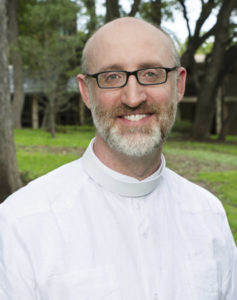I’ve been reading some of the popular work of an excellent social and moral psychologist named Jonathan Haidt. He published his work, The Happiness Hypothesis in 2006 as a result of teaching “Psychology 101” at the University of Virginia for 10 years. He decided he wanted students not just to learn facts, figures and dates about modern psychology, but to come out of the class happier than when they entered. We also recently used his 2012 book, The Righteous Mind, as a textbook in our Anglican Studies Class. In The Righteous Mind he continues his previous insights and extends them to society, politics and cross-cultural encounter.
Haidt presents recent psychological research that confirms an important truth: most of the time we simply have no idea why we are doing what we are doing. We respond to most of the things we experience in life by immediate gut reactions. But here is the crazy part: Our minds hurry along afterwards, like well-paid lawyers, in order to explain why what we did, said, or decided to believe was or is the most obvious, logical, rational thing that anyone else with our wisdom and life experience would have felt compelled to choose in the exact same situation. This is called “confabulation.” This confabulation helps to aid the delusion that our previous gut reaction actually was a well-informed rational decision. Furthermore, when other folks don’t follow our decision and behavior patterns, rather than question our own we are deft at and rather quick to explain away their deviation from the obviously right choice (the one we made) by means of pointing out how they are fatally flawed or just damaged goods. Perhaps they are even pure evil.
Now, of course, most of us are perfectly willing to recognize that we also have been schooled by hard knocks, but in our case, of course, that doesn’t make us damaged goods or insanely biased. Rather, it contributes to our innate wisdom and brilliance. If only more people would listen to us, the world would be such a better place.
Furthermore, we are all doing this, all the time, at the same time as everybody else. So how do we make it? Well, we are constantly comparing ourselves to others. We compare ourselves to others so that we can spin opinion in our own favor. This is fairly easy to do. We simply inflate our own claims and disparage the claims of others. Our inner-lawyer has years of experience of doing this in the face of our own random decisions and passion-driven proclivities.
Thus we find the inevitability of human hypocrisy. In our fast and furious condemnation (such as, for example, our not so secret delight in laughing at others who get caught in their own webs, for example) we only compound our own hypocrisy. If this sounds familiar there is some good news: you are not alone. We all do this.
Our tendency to look for information that supports what we already want to believe is called confirmation bias. In general, we find what we are looking for and we safely ignore anything we don’t want to see. When we say to ourselves (which we do, if we are honest, most of the time) “it is plain as day that everyone is influenced by ideology, bad experiences and self-interest. Except, of course, for me. I see things as they really are,” then we are living out what Haidt calls naïve realism.
Haidt then goes on to take things to the next level. He explains how human beings are also eusocial creatures, like wasps, bees and naked mole rats. We are “hive” creatures. We are not just 90% chimpanzee, as they say, but we are also at least 10% bee! So here is where the real big problems begin: all this self-righteous hypocrisy easily ratchets right up to the corporate level with swift fluidity. Haidt calls this the “myth of pure evil.” WE are obviously right. Anyone who disagrees with us is either sadly crazy or actually, simply PURE EVIL. And anyone who questions this obvious fact is also on the side of the devil! So the myth of pure evil combines our hive-nature with our self-righteous hypocrisy and makes the worst possible form of naïve realism take hold in our world: the people groups who disagree with us must be PURE EVIL!
The only way out of this, according to Haidt, is to listen to an important ancient teacher. His name is Jesus. Jesus said, take the speck out of your own eye before you try to take the log out of your neighbor’s eye (Matthew 7:3-5). This is because (among other things) we get far better results, according to solid psychological research, asking people to look at what might be flawed in their own positions than we do when we try to ask people to find what is helpful or good in the positions of those with whom they disagree. However, once the work of studying one’s own biases begins, finding truth in the views of others becomes easier, even insightful.
Haidt concludes his Happiness Hypothesis with the suggestion that a good place to look for wisdom is in the minds of those with whom we disagree – whether at the personal or the group levels of being human.
Are we ready to look for wisdom in the minds of those with whom we disagree?
Are we ready to take out the speck in our own eye?
Are we ready to let go of the myth of pure evil?


